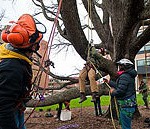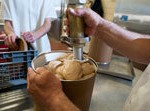Tag College of Agricultural and Life Sciences
Family Horticulture Day brings the color of gardening to life
Just as the weather improves and the urge to get back into the garden hits, the University of Wisconsin–Madison's West Agricultural Station is hosting Family Horticulture Day on Saturday, May 15.
Recent sightings: Climbing up
Students in Professor Laura Jull’s Horticulture 375 class watch a demonstration by certified arborist Sean Gere (center) during a tree-climbing lab conducted at the…
Recent sightings: ‘In the Dark’
Ice cream and butter maker Tim Haas fills containers with In the Dark, an ice cream specialty flavor being produced during a 150-gallon run…
UW-Madison faculty honored by American Chemical Society
On March 23, five University of Wisconsin–Madison faculty members and one former student were recognized by the American Chemical Society at its annual meeting in San Francisco.
On slippery science subjects, Internet news delivers
Internet-based science news draws a more demographically diverse, learned and focused audience than print or television news, according to a study by University of Wisconsin–Madison communication researchers.
Study explores link between sunlight, multiple sclerosis
For more than 30 years, scientists have known that multiple sclerosis (MS) is much more common in higher latitudes than in the tropics. Because sunlight is more abundant near the equator, many researchers have wondered if the high levels of vitamin D engendered by sunlight could explain this unusual pattern of prevalence.
From raw biomass, chemical process produces simple, fermentable sugars
A University of Wisconsin–Madison research team has developed a promising new chemical method to liberate the sugar molecules trapped inside inedible plant biomass, a key step in the creation of cellulosic biofuels.
DNR taps UW–Madison expertise to measure, manage state deer herd
Wisconsin wildlife managers are tapping into University of Wisconsin–Madison expertise in wildlife ecology, forest ecology and environmental communications in order to better manage the state's population of white-tailed deer.
Wisconsin’s organic farmers are largely weathering the economic storm
The current financial downturn hasn't spared Wisconsin's organic farmers, but in general they have been able to ride it out, says a new report about the state's organic sector.
Demand for local food challenges distribution systems, report finds
Consumers' growing appetite for locally produced food presents both an opportunity and a problem for local growers.
New UW–Madison agronomist leads international corn-breeding project
When corn breeder Kevin Pixley arrived on the University of Wisconsin–Madison campus in November, one of the first things he had to do was learn to use the word "corn."
Stem cells: Science, economy edge religion at the polls
When it comes to stem cell research as a political issue, Wisconsin voters are more likely to be motivated by ideas of economic benefit and scientific progress than by religious objections, according to a new report.
Diving milk prices cut state net farm income by more than half in 2009
Times were hard for farmers across the country in 2009, but they were harder than average for Wisconsin farmers.
National agribusiness news program to tape town-hall event
"Market to Market," the nation's longest-running agribusiness news show, will host a rural economic summit on Wednesday, Jan. 20, immediately following the Wisconsin Agricultural Economic Outlook Forum.
U.S. faces widening information gap on nanotechnology
As the global nanotechnology industry continues to produce cutting-edge consumer products, the scientific community is leaving a key part of the U.S. public behind when sharing knowledge of this new field of science, according to a new study by the University of Wisconsin–Madison and Arizona State University.
UW-Madison scientists create super-strong collagen
A team of University of Wisconsin–Madison researchers has created the strongest form of collagen known to science, a stable alternative to human collagen that could one day be used to treat arthritis and other conditions that result from collagen defects.
Regulatory network balances stem cell maintenance, differentiation
While much of the promise of stem cells springs from their ability to develop into any cell type in the body, the biological workings that control that maturation process are still largely unknown.
Migratory birds bear brunt of climate-charged weather
As global climate change fuels more frequent and intense hurricanes and droughts, migratory birds, especially those whose populations are already in decline, will bear the brunt of such climate-fueled weather, suggest a pair of new studies.
Forum to unveil 2010 forecast for Wisconsin’s agricultural economy
The third annual Wisconsin Agricultural Economic Outlook forum will review the impact of the 2009 economic downturn on the financial condition of the state's agricultural sector and consider its prospects for 2010.
Conservation areas threatened nationally by housing development
Conservationists have long known that lines on a map are not sufficient to protect nature because what happens outside those boundaries can affect what happens within. Now, a study by two University of Wisconsin–Madison scientists in the department of forest and wildlife ecology measures the threat of housing development around protected areas in the United States.







